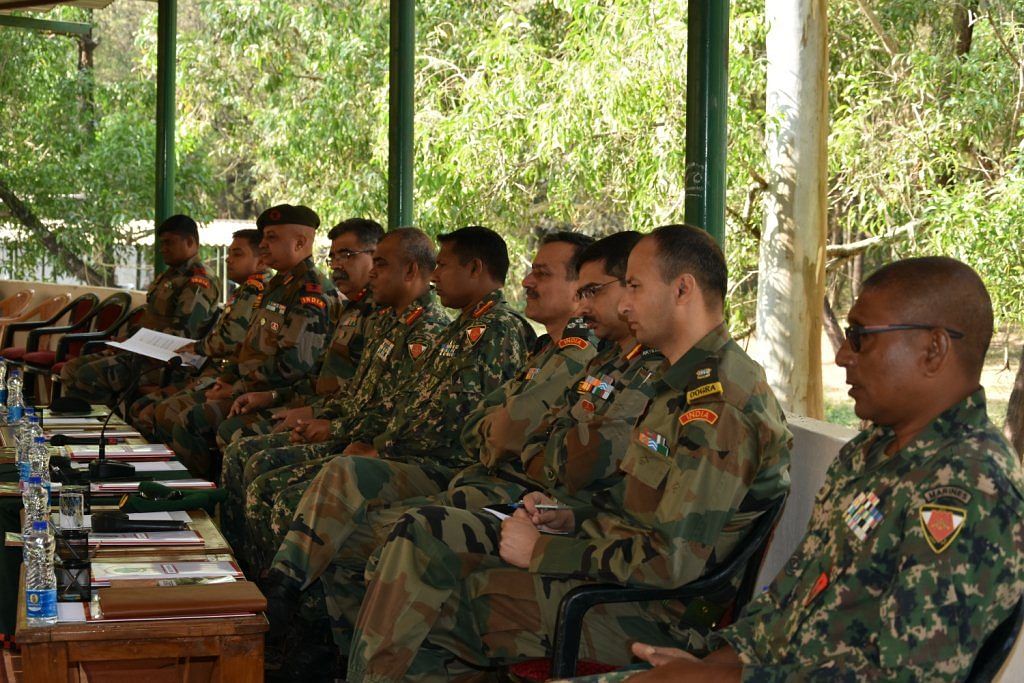The order changing military officers’ equations vis-à-vis civilian officials has been rescinded. Further heartburn needs to be prevented.
Another shot has been fired in the Ministry of Defence’s longest running conflict. Except that the shot was not fired from a gun, or any weapon system in the armoury. It was, in fact, a pen that altered the contours of this conflict once again. The duellists are not arranged along any border, or on either of the two lines that are perpetually in conflict. The duellists are, as they have been for the past almost 60 years, occupying office space separated by mere metres within the Ministry of Defence.
After almost a year of heartburn, armed forces officers heaved a sigh of relief and experienced a sense justification when the MoD rescinded its previous order of changing their equations vis-a-vis civilian officials.
The previous order caused considerable consternation, heartburn, heaps of data usage on social media, and a sense of being let down. It was, in a nutshell, a re-structuring of the prevailing order within MoD. And the prevailing order had armed forces officers enjoying parity with their civilian counterparts based on the rank held. A colonel, for example, was equated with a director from the civil services.
This arrangement was changed in 2016, and which caused an eruption of ire within the armed forces. In any other system, or ministry, it would seem an infantile matter, but not when it comes to the MoD. That is solely because there is a long history to this turf battle, and which goes back decades, to an innocuous post, the termination of which is long considered to the first shot fired in this conflict in perpetuity. The turf being battled over is not, of course, quantifiable in terms of space or size, for it occupies only the contours of institutional minds.
The first shot
In its early days, the Ministry of Defence had an appointment called Camp Commandant held by an armed forces officer, a Lt. Colonel or equivalent. Like all such commanders of camps, the responsibilities were greater in proportion to the rank held, or it seems now to those elevated, but disproportionately under-utilised.
With the deft use of a pen, the MoD terminated this appointment, letting loose a conflict which hasn’t ceased to this day. The last shot has yet not been fired in this tussle.
Struggle for supremacy
Over the years, this struggle for supremacy has entered new arenas, taken other routes, and metastasised to include debates over pay, perks, and privileges. And this has happened because of the peculiar composition, and nature, of an Indian ingenuity called the Pay Commission. Every decade this body is announced, meets regularly, travels the country, accepts proposals, views presentations, and then announces an award that will be applicable to every government employee’s pocket. Every decade, without a break from the past, associations and unions appear to express their angst with the proposals, and thus negotiate a better deal.
The armed forces are no innocents in this game, but actually masters in using information warfare to buttress, highlight, and underline their plight. It is the same grouse every time, and it stems from comparing who gets what, in which rank, and after how many years of service. The rules of the game are stacked against the armed forces, and this is taken as the continuing slight that the ‘civilians’ inflict on them.
The Camp Commandant of yore would have been able to handle this matter, if it existed then. But there is none now, and this matter vexes the military minds every decade, and in between too.
There is an often-used, but largely unheard of, Indian document called the Warrant of Precedence. As all things government are run on the basis of who stands ahead in the line, this is the document that decides the list as it were.
Over the years, the Warrant of Precedence has been altered, or so it is believed within the armed forces. As a result of which various military ranks are continually getting devalued. As a consequence, the armed forces are the real losers when it comes to pay commission awards, as they are not adequately compensated for the risks taken and the years served.
This, at least, is the prevailing perception, across the board within the three services, when it comes to being equated with civilian employees.
The solution
The long-term solution to this constant sniping at protocol, precedence, pay, and perceptions, is to institutionalise a separate pay commission for the armed forces, membership of which can also draw from the uniformed fraternity.
At same time, rank equivalence must be instituted on the basis of years of service. There is no other way of equating two completely different sets of officers who perforce share work space.
Parity in the mind is the most important battle being fought within MoD, and this good step needs to be cemented to prevent future mishaps.
Manvendra Singh is Editor, Defence and Security Alert magazine & a BJP MLA from Rajasthan.
